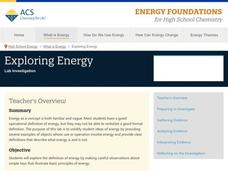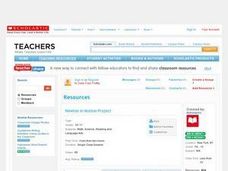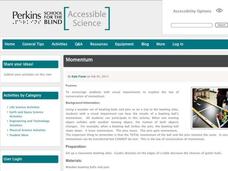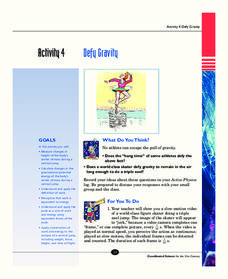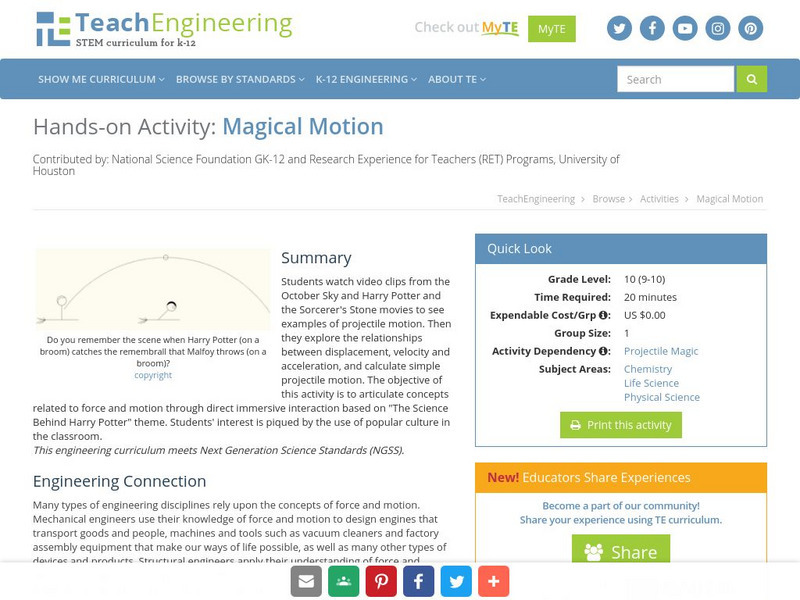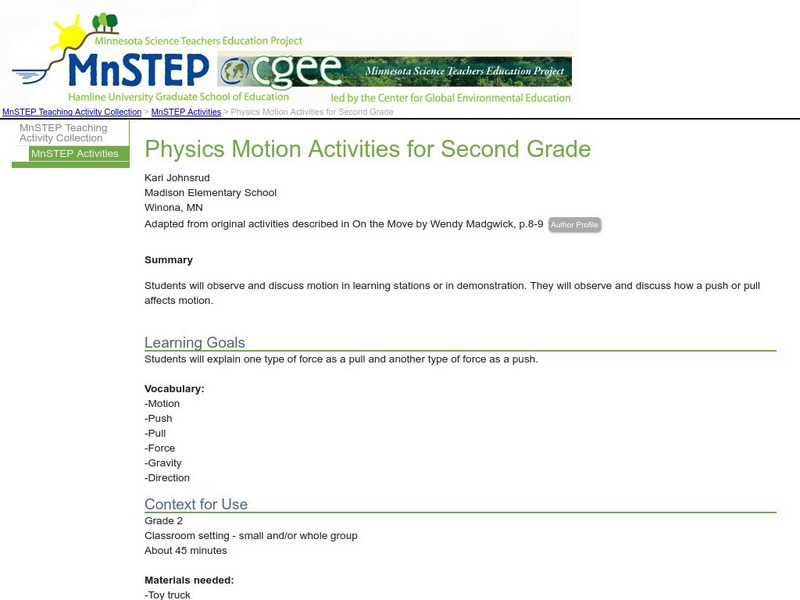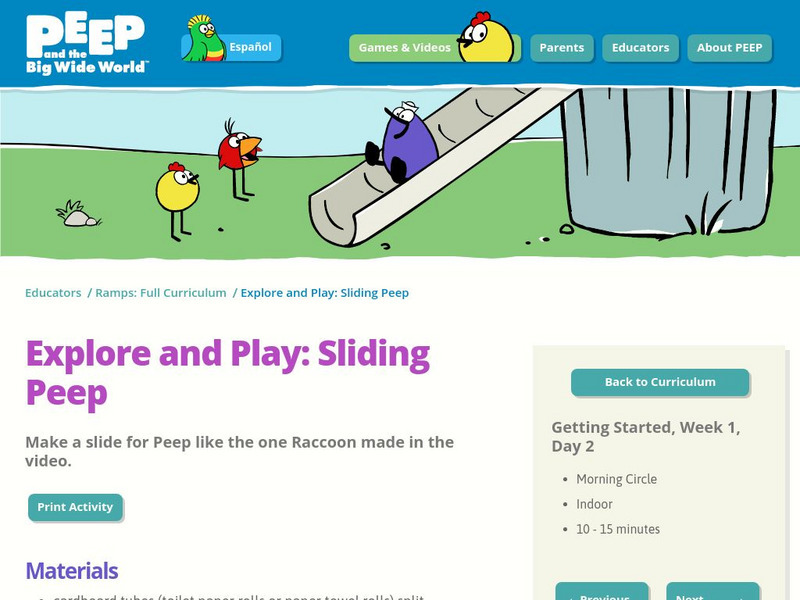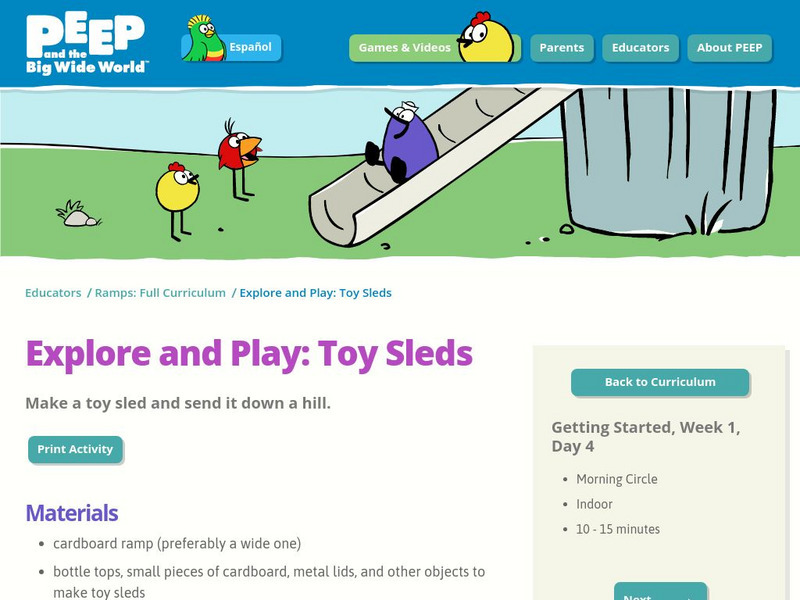NASA
Make a Planetary Exploration Balloon
Balloons aren't just for parties! An inquiry-based lesson explores the idea of using balloons for space exploration. Learners become engineers as they attempt to control the ascent and descent of a helium balloon using different masses.
It's About Time
Circular Motion
Lead your class in this exciting activity to learn more about motion and its importance. Pupils learn about a centripetal and why it is required to maintain a constant speed in a circulating moving mass. They apply the equation for...
American Chemical Society
Exploring Energy
When asked to list everyday objects that require energy, most people list technology that use batteries or electricity. Through hands-on exploration, young scientists discover energy is much more than just circuitry. They play with...
Teach Engineering
Magical Motion
Make solutions to projectile motion problems magically appear using equations. Pupils watch a clip from a Harry Potter movie and find the length of time it takes for a remembrall to fall into Harry's hands. They use a projectile motion...
NASA
Touchdown
Just how do astronauts stay safe during moon landings? Here's an activity that allows investigators to use the engineering process to explore how shock absorbers protect astronauts during landing. Applying knowledge of gravity, force,...
Curated OER
Newton in Motion-Project
Students investigate Newton's Third Law of Motion. In this Newton's Third Law of Motion lesson, students explore the law in the real world. Students break down the definition for understanding and do an experiment using a balloon.
Teach Engineering
Exploring Acceleration with an Android
Small groups use rubber bands to accelerate an Android device along a track of books. They collect the acceleration data and analyze it in order to determine the device's velocity.
It's About Time
Run and Jump
Has your class wondered how fast a human could run or how high they are capable of jumping? Help them understand these concepts as they explore acceleration and use an accelerometer to make semiquantitative measurements of acceleration...
Museum of Science
Balloon Racers
Watch those balloon cars go! Scholars build racers that run using the power of balloons and conduct races with the cars. They learn about Newton's third law of motion and how it applies to their balloon racers.
It's About Time
The Mu of the Shoe
What is mu? Emerging scientists explore the coefficient of sliding friction, or mu, and apply its concepts as they complete activities in the interesting lesson. They measure the sliding friction between soles of their own athletic shoes...
Perkins School for the Blind
Momentum
The laws of momentum can lead to fun! Learners with visual impairments use bowling pins and a bowling ball to model the law of conservation of momentum. They take turns bowling with differing degrees of force to explore how energy is...
It's About Time
Defy Gravity
Test the limits of gravity while encouraging full class participation with this thrilling lesson. Pupils investigate the meaning of work and how it is equivalent to energy. They explore the joule and apply it as a unit of work. They...
DiscoverE
Air-Powered Mini Rocket
Does the position of the clips make a difference? The activity provides directions to build and test a paper rocket. Pupils attach paper clips to the rocket in different configurations and measure the distance the rocket flies each time....
Curated OER
The Physics of Sports: An 8th Grade Physical Science Project
Explore the relationship between sports and physics in a cross-curricular lesson. Middle and high schoolers prepare a multimedia presentation based on a chosen sport. They answer five physics vocabulary questions about how the laws of...
American Museum of Natural History
Create a Compass
Historically, humans have used many methods of finding due north. Using a hands-on activity, learners create their own compasses. They then test their compasses in their neighborhood or to assist with stargazing.
DiscoverE
Pilot a Balloon
Balloons will go where you want them to. Young pilots first add paper clips to a balloon to make it neutrally buoyant. They then use cardboard to steer the balloon in different directions, taking air pressure into account.
TeachEngineering
Teach Engineering: Magical Motion
Students watch video clips from the October Sky and Harry Potter and the Sorcerer's Stone movies to see examples of projectile motion. Then they explore the relationships between displacement, velocity and acceleration, and calculate...
Science Education Resource Center at Carleton College
Serc: Physics Motion Activities for Second Grade
A lesson plan for stations that allow students to explore how a push or pull affects motion.
PBS
Pbs Teachers: Zoom Vehicle
Explore forces of motion and properties of gasses by building a vehicle that runs along a string track powered by air pressure.
Exploratorium
Exploratorium: Science Snacks: Strange Attractor
Explore the chaotic motion of a pendulum that is swinging above several magnets that are fixed in place and see what patterns you can find.
PBS
Wgbh: Peep and the Big Wide World: Explore and Play: Sliding Peep
Students make their own ramps and test them out by sending various objects down them.
PBS
Wgbh: Peep and the Big Wide World: Explore and Play: Snowy Hills
Students make two snowy hills, one steep and one gentle, to discover their effects on rolling objects.
PBS
Wgbh: Peep and the Big Wide World: Explore and Play: Toy Sleds
Students experiment with different materials and objects to make a sled that will slide down the ramps.
TeachEngineering
Teach Engineering: Sliding Textbooks
In this culminating activity of the unit which highlights how forces play a role in engineering design and material choices, students explore and apply their knowledge of forces, friction, acceleration, and gravity in a two-part experiment.


